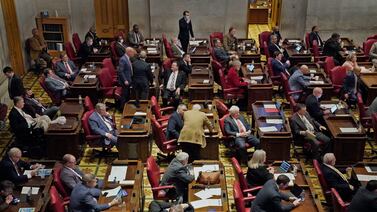Amid protests from Democrats and some dissent among Republicans, a GOP-led Senate committee on Tuesday advanced a bill that would limit the state from promoting “race or gender stereotyping” in schools.
Lawmakers advanced House Bill 5097, which would restrict what can be taught about race and forbid teaching that “individuals bear collective guilt for historical wrongs committed by their race or gender.”
While the bill does not use the term “critical race theory,” it has similar ideas to Senate Bill 460, which would ban teaching of the controversial subject in schools.
But even Republicans are split on the topic.
Sen. Jim Runestad, R-White Lake, said Tuesday he believes that “just about every school in the state of Michigan” is teaching students “collective guilt” and making them “profess their privilege based on race.” On the other hand, Sen. Ken Horn, R-Frankenmuth, said he has not had a single parent, teacher or school administrator raise a concern to him about what the Republicans are calling critical race theory.
Opponents say critical race theory — a way of examining laws and history that states racism is embedded in institutions from education to housing — isn’t taught in K-12 schools and that the bills limiting the teaching of history serve as a distraction.
The bill passed out of the Education and Career Readiness Committee on Tuesday with four Republicans recommending the bill. Horn abstained, while two Democrats — Sens. Dayna Polehanki, D-Livonia, and Erika Geiss, D-Taylor, walked out in protest, calling the bill “anti-truth.”
Rep. Andrew Beeler, R-Port Huron, the bill sponsor, said the legislation would ban “targeted racial and gender attacks against kids.” He said his bill would ensure that teachers do not include race and gender stereotypes.
“I want kids in Michigan to learn about the evils of history. I just don’t want them to be held personally responsible for them,” he told the committee on Tuesday.
“Simply put, this bill does nothing to impact an honest teaching of history. It only bans using history as a weapon against students based on their race or gender.”
Geiss said the legislation is “not a serious bill from a serious person.” Polehanki, a former K-12 teacher, said the bill is “designed to terrify teachers into avoiding any meaningful discussion about racial discrimination.”
“We keep entertaining this really ridiculous stuff that is not focused on the things that educators are saying they need or want in order to improve education,” Geiss told Bridge Michigan.
The Michigan Department of Education, Michigan Education Association and Michigan Association of School Boards have all expressed opposition to the bill.
A spokesperson for Gov. Gretchen Whitmer did not respond to a request for comment, but Whitmer is likely to veto the bill if it passes the Legislature.
Critical race theory is taught in some colleges to explore the lingering effects of race-based policies.
But over the last couple of years, the term has been used as a catch-all term to describe schools teaching about race in ways that some parents do not agree with.
Central Michigan University sociology professor Cedric Taylor told Bridge the theory “tries to center the experiences of groups that have been historically silenced. And so, there is a kind of understanding of an America that is very, sort of reflective of the majority, of their worldview.”
He said by centering the majority’s worldview, people can walk out of education with a “misunderstanding” of the country and its history. The 1619 Project, a product of the New York Times Magazine, “highlights a particularly ugly aspect of American history,” and some parents don’t want their children to have to contend with the negative feelings associated with slavery, he said.
Last summer, the Pulitzer Center announced there will be 41 teams of educators to help develop curriculum resources after exploring the 1619 Project. In Michigan, teachers from Wayne County and Ann Arbor were selected, according to the Pulitzer Center.
The Times project won a Pulitzer Prize for commentary, but it has faced scrutiny from some historians. The separate Senate bill, which is sponsored by Sen. Lana Theis, R-Brighton, would forbid schools to teach materials from the project.
She told Bridge both bills would “improve the situation” in schools. She said she gets reports about critical race theory in schools “all the time,” but did not provide a list of specific examples.
Beeler’s bill would ban any “race or gender stereotyping” in Michigan’s curriculum, including the beliefs that:
- All members of a racial, ethnic, or gender group have the same qualities and beliefs.
- Actions and beliefs are caused by racial or gender identity.
- People are born racist or sexist “by accident of their race or gender.”
- People “bear collective guilt for historical wrongs committed by their race or gender.”
- Norms and practices of a racial, ethnic, or gender group are flawed.
- Racism or sexism are inherent in people from particular racial, ethnic, or gender groups.
- A racial, ethnic, or gender group is in need of “deconstruction, elimination, or criticism.”
- Actions of an individual serve as an indictment against the person’s race or gender.
Last fall, the bill passed in the House with 55 votes while the Democrats refused to vote after Rep. Brad Paquette, R-Niles, cut off debate while opponents of the bill still wanted to speak.
Isabel Lohman is a reporter for Bridge Michigan. You can reach her at ilohman@bridgemi.com








